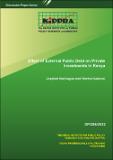| dc.description.abstract | Efficient and modern infrastructure is crucial for economic transformation in Kenya, creating a favorable business environment and income-generating opportunities for private investors. To finance key public infrastructure projects, external debt is utilized due to their substantial capital requirements exceeding domestic revenue capacity. Foreign borrowing enables the government to generate savings and ensure productive spending on infrastructure, thereby stimulating private investment. This study examines the relationship between private investment, external public debt, and debt sustainability. External debt is measured as the ratio of external debt stock to GDP, while debt sustainability is assessed through the ratio of external debt service to exports. The results indicate that in the long run, higher external debt levels encourage private investment as the private sector benefits from the infrastructure services associated with public investments financed by external debt. However, in the short run, uncertainty regarding debt sustainability and future tax policies may discourage investment. Sustainable external debt leads to short-term increases in private investment, while deteriorating debt sustainability hampers long-term private investment. Positive effects on private investment are observed for real GDP growth rate, private sector credit, and real effective exchange rate. To ensure that debt does not constrain private investment, it is vital to enhance debt management, focus on debt structure and composition, improve project management for high multiplier effects, and explore alternative sources of financing public investment, including local sources. | en |

